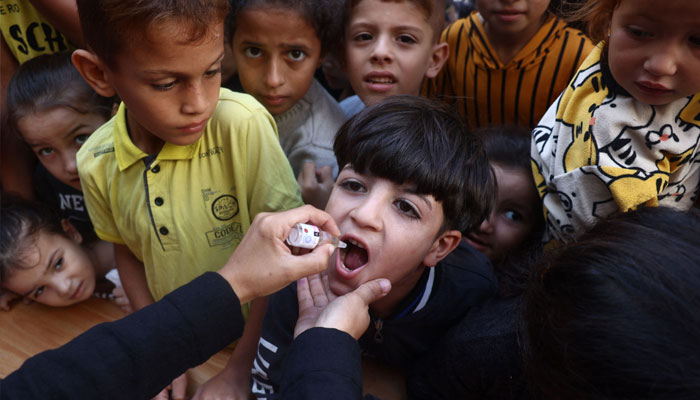41st polio case reported from Balochistan
So far, the province has reported 21 of the 41 cases in Pakistan
ISLAMABAD: The Regional Reference Laboratory for Polio Eradication at the National Institute of Health (NIH) has confirmed Pakistan’s 41st case of wild poliovirus type 1 (WPV1) this year, detected in a 42-month-old girl from Loralai District, Balochistan.
According to the Polio Eradication Initiative (PEI), the child experienced the onset of paralysis on October 8, and on Friday, laboratory tests confirmed that she had contracted WPV1.
This marks the first confirmed polio case in Loralai District and highlights a troubling trend: Balochistan is emerging as an area of intense polio transmission this year. So far, the province has reported 21 of the 41 cases in Pakistan, with other cases spread across Sindh (12), Khyber Pakhtunkhwa (six), and one each in Punjab and Islamabad.
Although this is the first recorded case from Loralai, officials indicate the virus may have been present in the area for months, as four consecutive sewage samples from Loralai have tested positive since June, signalling sustained virus circulation. Genetic sequencing of samples collected from the infected is underway to understand more about the virus’s transmission patterns.
A senior official with the national PEI expressed concern over the extent of WPV1 transmission in the country, emphasizing that Loralai is not an isolated case. “Balochistan’s first case in Loralai adds to a disturbing picture,” the official said, “and we now have 204 positive environmental samples from 71 districts across Pakistan. The virus is circulating in many areas, with cases emerging undetected, which is alarming.”
With Pakistan being one of only two countries where wild poliovirus transmission has not been eradicated, health officials are urging parents to actively participate in the upcoming nationwide polio vaccination campaign, set to launch on October 28.
The campaign, led by Pakistan’s Polio Programme aims to vaccinate over 45 million children under the age of five. Officials stress the importance of full participation as incomplete vaccination coverage leaves communities vulnerable to the continued spread and resurgence of polio.
The urgency of the campaign is underscored by the virus’s persistence, which officials say is due to various challenges in vaccination coverage, including vaccine refusals, high population movement, and gaps in reaching remote areas.
The PEI official noted that while polio teams have made significant efforts in many parts of the country, the virus’s resilience requires stronger collaboration from local communities. “Parents must open their doors to vaccinators and ensure every child receives two drops of the oral polio vaccine to shield them from the lifelong effects of polio,” he emphasised.
Since its launch in 1994, Pakistan’s polio eradication programme has largely contained the virus. However, recent genetic traces show that WPV1 is still circulating in previously controlled areas. The current challenge is to eliminate polio’s final strongholds through ongoing vaccinations and public cooperation. As the October 28 vaccination drive approaches, health authorities stress the need for vaccinations in high-risk areas to protect future generations from paralysis.
-
 Andrew, Sarah Ferguson Refuse King Charles Request: 'Raising Eyebrows Inside Palace'
Andrew, Sarah Ferguson Refuse King Charles Request: 'Raising Eyebrows Inside Palace' -
 Adam Sandler Reveals How Tom Cruise Introduced Him To Paul Thomas Anderson
Adam Sandler Reveals How Tom Cruise Introduced Him To Paul Thomas Anderson -
 Washington Post CEO William Lewis Resigns After Sweeping Layoffs
Washington Post CEO William Lewis Resigns After Sweeping Layoffs -
 North Korea To Hold 9th Workers’ Party Congress In Late February
North Korea To Hold 9th Workers’ Party Congress In Late February -
 All You Need To Know Guide To Rosacea
All You Need To Know Guide To Rosacea -
 Princess Diana's Brother 'handed Over' Althorp House To Marion And Her Family
Princess Diana's Brother 'handed Over' Althorp House To Marion And Her Family -
 Trump Mobile T1 Phone Resurfaces With New Specs, Higher Price
Trump Mobile T1 Phone Resurfaces With New Specs, Higher Price -
 Factory Explosion In North China Leaves Eight Dead
Factory Explosion In North China Leaves Eight Dead -
 Blac Chyna Opens Up About Her Kids: ‘Disturb Their Inner Child'
Blac Chyna Opens Up About Her Kids: ‘Disturb Their Inner Child' -
 Winter Olympics 2026: Milan Protestors Rally Against The Games As Environmentally, Economically ‘unsustainable’
Winter Olympics 2026: Milan Protestors Rally Against The Games As Environmentally, Economically ‘unsustainable’ -
 How Long Is The Super Bowl? Average Game Time And Halftime Show Explained
How Long Is The Super Bowl? Average Game Time And Halftime Show Explained -
 Natasha Bure Makes Stunning Confession About Her Marriage To Bradley Steven Perry
Natasha Bure Makes Stunning Confession About Her Marriage To Bradley Steven Perry -
 ChatGPT Caricature Prompts Are Going Viral. Here’s List You Must Try
ChatGPT Caricature Prompts Are Going Viral. Here’s List You Must Try -
 James Pearce Jr. Arrested In Florida After Alleged Domestic Dispute, Falcons Respond
James Pearce Jr. Arrested In Florida After Alleged Domestic Dispute, Falcons Respond -
 Cavaliers Vs Kings: James Harden Shines Late In Cleveland Debut Win
Cavaliers Vs Kings: James Harden Shines Late In Cleveland Debut Win -
 2026 Winter Olympics Snowboarding: Su Yiming Wins Bronze And Completes Medal Set
2026 Winter Olympics Snowboarding: Su Yiming Wins Bronze And Completes Medal Set




